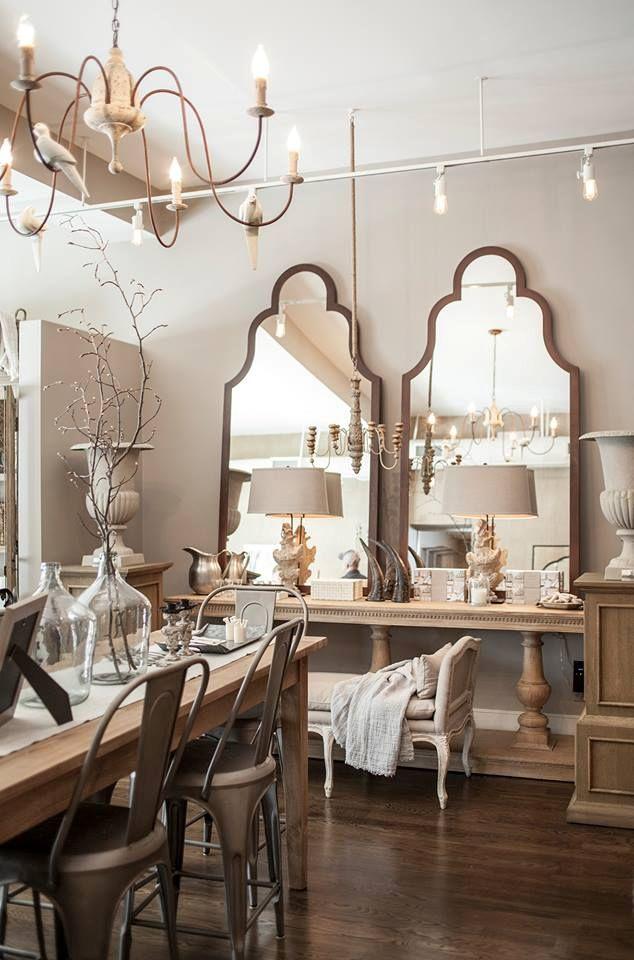
Do Use Mirrors in Narrow Hallways & Staircases Feng Shui also recommends mirror placement in entrance hallways as it’s said to convey a welcoming greeting. There is lots to the concept but basically, the experts suggest that mirrors resemble the energy of water and placing a mirror in the likes of a living room will bring positive energy and add an air of calm and relaxation. Mirrors are one of the most powerful interior tools of Feng Shui.

We adore the Windsor mirror below for its antique-style ornate detailing which would add glamour to any bedroom.
#DINING ROOM MIRROR FREE#
In bedrooms, mirrors will look nice above headboards but it’s best to not place a mirror opposite to your bed because it will reflect messy untidy beds and you’ll also be greeted with your own reflection first thing in the morning! Go against the grain for a bedroom mirror by choosing a rectangular shaped mirror (as opposed to a round mirror) and add a free standing desk for a bespoke vanity area. Splashes of water will stain and you’ll be kept busy clearing water marks.

While creating your own interiors is about emphasising your own style and there shouldn’t be any rules when your own personal taste is concerned, the experts do say that mirror placement should be taken with caution in the likes of a kitchen. You can use up a dark corner and place a spotlight lamp behind the mirror to create a focal point out of an otherwise underutilised corner.ĭon’t Go Overboard with Mirrors in the Kitchen & Bedroom Add a more informal approach and use up vacant space by introducing an oblong or tall mirror and rest it against a wall. Not all mirrors need to be attached to a wall. Place this beautiful decorative mirror over a console table in an entrance hallway or as a vanity mirror in an en-suite for stellar impact We love our take on the contemporary classic decorative sunburst mirror which is the Inca pictured below. You might have a sofa or console table to also follow to choose your centre point. Consider carefully the space on the wall you select for this type of mirror and ensure the symmetry is accurate if you want this decorative mirror to be the focus of the room, choose a wall and place the mirror as centrally as possible. With a decorative mirror, it’s best to keep nearby accessories minimal otherwise you could make the room too chaotic with lots going on. Do Treat Decorative Mirrors as Pieces of Artĭecorative mirrors can be functional but some serve as practically a work of art over function and as a result, they can be hugely impactful in a particular space. Instead select a location(s) for a mirror where you will make an impact, add dimension, add function, creating a diversion, and so on. For example, you don’t want to place a mirror on a wall where it will be reflecting something that you don’t want attention drawn to and that looks like clutter such as a coat rack. It’s tempting to fill any empty space on your walls with a mirror but it’s best to think your placing through carefully. We would recommend the Sasha mirror in the likes of a small room because its frame is subtle in colour and texture yet its shape adds interest and elegance.ĭon’t Choose Random Vacant Wall Space for a Decorative Mirror The bigger mirror the better in this instance.

It will make that lighting fixture stand out and it will give the illusion that the room is larger than it actually is. Mirrors will add depth to a room so if you have a small dining room for example, hang a decorative mirror of any shape on the wall to reflect your lighting/chandelier. It all depends on where you place them and there are some caveats that you can follow in order to select the best one for your needs! Do Use Large Decorative Mirrors in Small Rooms They can take centre stage in a room, add function, accentuate light or they can provide a supporting role to the rest of a room’s accessories. Decorative mirrors are a fantastic accessory purchase for the home.


 0 kommentar(er)
0 kommentar(er)
